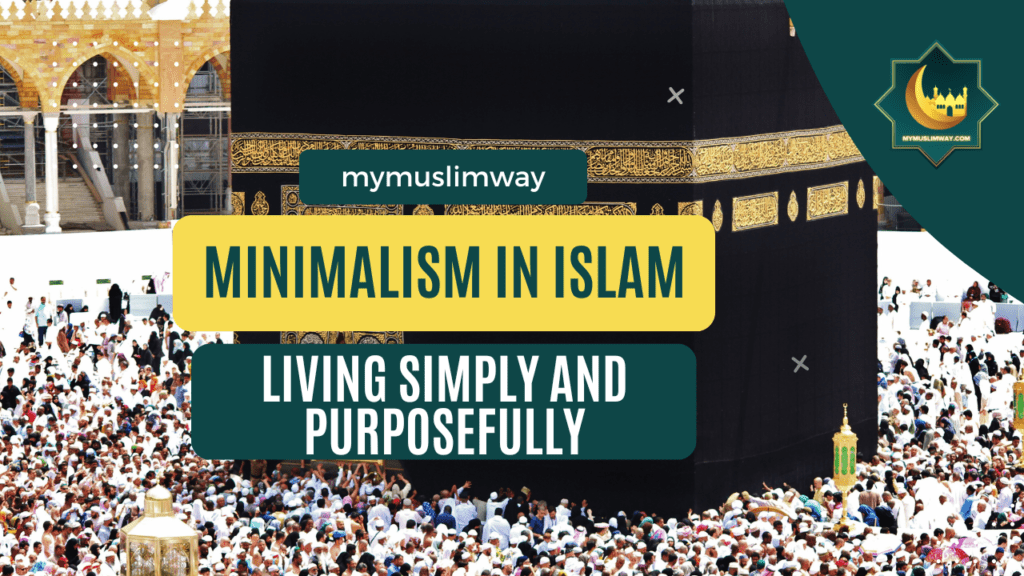Minimalism in Islam: Living Simply and Purposefully
In a world inundated with excess—where materialism often overshadows spirituality—embracing minimalism can be a refreshing and transformative approach to life. Minimalism, defined as a lifestyle that prioritizes simplicity and intentionality, resonates deeply with the teachings of Islam. It invites us to reflect on the essence of our humanity, urging us to focus on what truly matters: our relationship with Allah (SWT), our purpose in life, and the well-being of those around us. In this blog post, we explore the concept of minimalism in Islam and how it can lead to a more fulfilling and purposeful life.
—
Understanding Minimalism in the Islamic Context
At its core, minimalism encourages us to declutter our lives—physically, mentally, and spiritually. It aligns with the Islamic principles of moderation and simplicity, as emphasized in the Qur’an and the teachings of the Prophet Muhammad (peace be upon him). The Prophet is often cited as exemplifying a simple lifestyle, as he lived with humility, prioritizing spiritual wealth over material possessions.
Islam teaches that true richness is not found in accumulating wealth or possessions but in contentment and gratitude. As Allah says in the Qur’an, “And do not kill your children for fear of poverty. We provide for them and for you. Killing them is a great sin” (Qur’an 17:31). This verse reminds us of Allah’s provision and encourages us to trust in His plans, freeing us from the anxiety of material scarcity.
—

The Benefits of Minimalism in Islamic Living
1. Fostering Spiritual Connection
Embracing minimalism allows us to focus on what truly matters—our relationship with Allah. By decluttering our lives of unnecessary distractions, we create space for prayer, reflection, and spiritual growth. This intentionality fosters a deeper connection to our faith, allowing us to engage more fully in acts of worship and gratitude.
2. Promoting Contentment
Minimalism teaches us to find joy in simplicity and appreciate what we already have. In a society that often equates happiness with material possessions, embracing a minimalist lifestyle encourages us to cultivate gratitude and contentment. The Prophet Muhammad (peace be upon him) said, “Wealth is not in having many possessions, but wealth is in being content with oneself.” This perspective nurtures a sense of peace and fulfillment, regardless of our circumstances.
3. Enhancing Focus and Clarity
A cluttered environment can lead to a cluttered mind. By simplifying our surroundings, we can enhance our focus and clarity. This is especially important in our spiritual practices; a serene and organized space promotes mindfulness during prayer and reflection. When we eliminate distractions, we become more present in our worship and daily activities.
4. Encouraging Sustainable Living
Minimalism naturally aligns with sustainable living, which is a vital aspect of Islamic teachings. Islam emphasizes stewardship of the earth and responsible consumption. By adopting a minimalist lifestyle, we can reduce waste, conserve resources, and live in harmony with our environment. This conscious approach promotes a sense of responsibility and gratitude for the blessings we have.
—
Practical Tips for Embracing Minimalism in Your Life
1. Declutter Your Physical Space
Start by assessing your living environment. Identify items that no longer serve a purpose or bring you joy. Donate, recycle, or discard these items with the intention of creating a more organized and peaceful space. Remember, each item you let go of can symbolize a commitment to a simpler, more purposeful life.
2. Simplify Your Schedule
In our busy lives, it’s easy to overcommit and spread ourselves too thin. Take a moment to evaluate your schedule and prioritize activities that align with your values and spiritual goals. Learn to say no to obligations that drain your energy or distract you from what truly matters.
3. Focus on Quality Over Quantity
Whether it’s clothing, possessions, or relationships, choose quality over quantity. Invest in items that are durable and meaningful, rather than accumulating numerous possessions that may provide temporary satisfaction. This approach fosters appreciation for what you own and encourages mindful consumption.
4. Practice Mindful Consumption
Before making a purchase, ask yourself if the item is truly necessary and how it contributes to your life. This practice helps curb impulsive buying and cultivates a sense of responsibility for your choices. Consider adopting the principle of “less is more” in your shopping habits.
5. Engage in Regular Self-Reflection
Take time to reflect on your life and the values you hold dear. Journaling or meditative practices can help clarify your priorities and intentions. By understanding what truly matters, you can align your actions with your purpose, fostering a deeper sense of fulfillment.
6. Incorporate Minimalism into Your Spiritual Practices
Create a serene environment for your prayers and spiritual practices. Designate a specific space for worship, free from distractions. Use this space to engage in dhikr (remembrance of Allah), read the Qur’an, or reflect on your spiritual journey.
—
Embracing a Purposeful Life
Minimalism in Islam is not merely about reducing physical possessions; it is about embracing a mindset of simplicity, intentionality, and gratitude. By decluttering our lives and focusing on what truly matters, we can foster a deeper connection with Allah, promote contentment, and enhance our overall well-being.
As we navigate the complexities of modern life, let us strive to live simply and purposefully, honoring the essence of our humanity and the teachings of our faith. May Allah guide us on this journey toward a more meaningful and fulfilling life. Ameen.

Leave a Reply